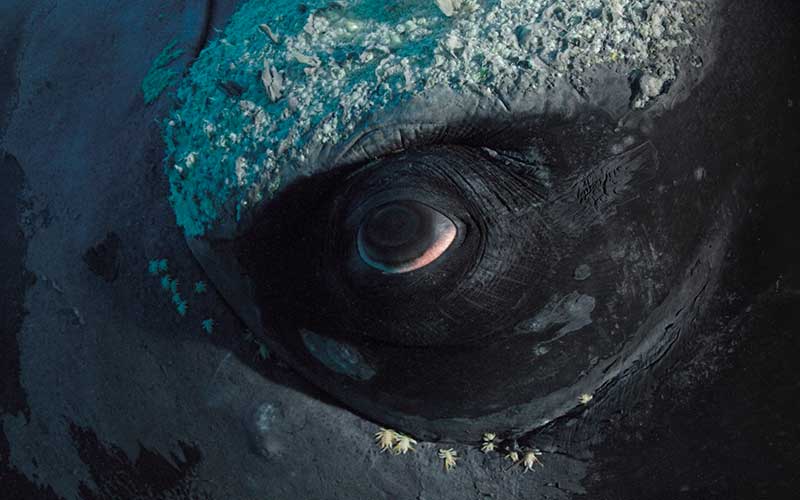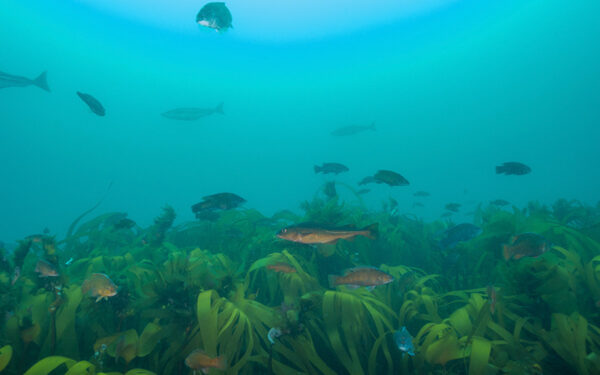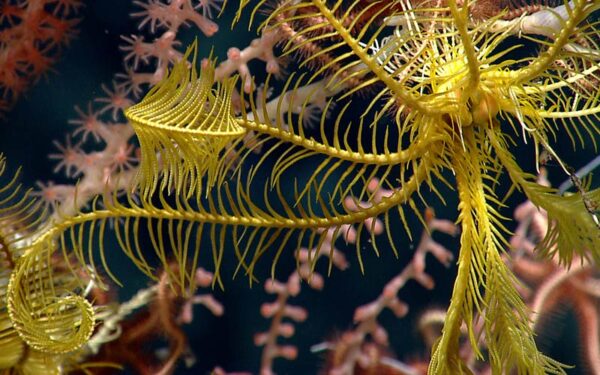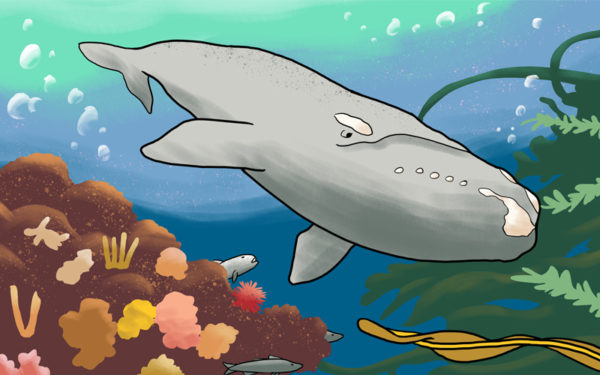
“We Are All Whalers” shines a light on how our actions as consumers – supporting industries that accidentally harm right whales – make all of us whalers. We can change that. Photo: Brian Skerry.
With fewer than 336 North Atlantic right whales remaining on the planet, we need all hands on deck to save this species from the brink of extinction. We all play a role and have responsibility to act. That’s the core message behind Dr. Michael Moore’s book, “We Are All Whalers.”
Since 1986, Michael Moore has dedicated much of his career to understanding the threats North Atlantic right whales face. As a life-long investigator at the Woods Hole Oceanographic Institution (WHOI), Michael has studied methods to safely free entangled whales from fishing gear, which causes most right whale deaths and injuries today. He has also researched the dangers of ship strikes on right whales to help policymakers set safer speed limits.
CLF has had the privilege to work with Michael Moore often over the course of his long career. Last year, we partnered with Michael and Brian Skerry, the renowned National Geographic photojournalist, to capture rare images of North Atlantic right whales in their feeding grounds in Cape Cod Bay. During this expedition, Michael and his team gave us insight into their research to understand this critically endangered species.
“We Are All Whalers” is Michael’s latest endeavor to advocate for North Atlantic right whales. The book shines a light on how our actions as consumers – supporting industries that accidentally harm this species – make all of us whalers. I sat down with him to learn more about this book and the impact he hopes this project will have to raise awareness about the plight of the North Atlantic right whales.
This interview has been edited for clarity.
What inspired you to write “We Are All Whalers”?
The inspiration for the book came from frustration. Over the years, I published many scientific papers and reports with colleagues. We figured out what’s going on with the mortality of right whales – specifically, in terms of [fishing gear] entanglements and vessel strikes. But I felt like we weren’t getting traction with the public. That’s my goal with the book – I want people to know what we know, worry how we worry, and feel like we feel [about right whales]. These animals are suffering – and that’s something we need to do a better job communicating.
In terms of right whale conservation, we often talk about the role of science, management, and regulations. But the public also needs to understand that the shipping and fishing industries [which accidentally harm right whales and other marine life] don’t exist without a consumer base. If there wasn’t a consumer base, there wouldn’t be a problem. So, I felt it was important to help the consumer base understand their role [in these conservation efforts].
How did your career as a scientist and veterinarian help you write this book?
Scientists are trained to be objective, dispassionate, and hypothesis-driven. Veterinarians are also objective – but beyond that, they have a role to be empathetic, supportive, and advocates for those animals. Being a scientist and veterinarian gave me a broader spectrum of comfort to write because the disciplines have comparable but different ethics.
For example, anthropomorphism (humanizing animals) is not seen as ethical within the scientific discipline. But, because of my veterinary training, it’s something that I employ quite a lot in the book.
Can you tell us more about your choice to humanize right whales?
For people to be empathetic about right whales, they need to understand their experiences in people’s terms. [In the book,] I wrote two short postscripts on the stories of two whales [right whales #2301 and #2030]. I looked at what we knew about each animal in terms of accidents and outcomes. And I was able to have a fact-based skeleton of their life stories. Then, I thought about getting inside the head of each of those animals to tell a story. [My goal was] to try and get a sense of how they feel and what it means to be entangled.
I also believe that anthropogenic trauma deserves anthropomorphism. If we’re doing something that hurts an animal, then those animals deserve the same perspectives that we have. And in the case of the right whales, the trauma is coming from human industries. If an industry were causing a mammal to be entangled in the streets of Boston for six months, slowly dying, it wouldn’t be acceptable to society. That’s exactly what’s happening at sea. The only difference is that we don’t see them.
What impact do you hope these stories will have on the plight of North Atlantic right whales?
I feel quite idealistic in this regard because I’m asking for us to change how consumer society operates. And, I’m asking for us to help right whales by changing how we do things – like selling and catching seafood without ropes.
More broadly, I’m asking for a more ethical consumerism. My hope is that these stories will create a sea change in how consumers demand their products be acquired, packaged, transported, and delivered. I’m not totally naive. And I understand that that’s a tall order, but that’s what it’s going to take.
A change in attitude and behavior from the public – that’s what I’m looking for.
What message would you like people to take from your book?
I want the readers to ask: “What can I do?” I’m not asking anybody to stop eating lobster. What I’m asking them to do is to communicate their willingness to pay for the cost of the changes that I’m proposing. [I’m asking people] to seek seafood that’s caught without ropes and to buy goods that are delivered by ships that are not going too fast.
But change is not going to happen by individual product choice. Change is going to happen by reaching out to your elected representatives and the managers in charge of state and federal waters and saying, “This really does matter.”
What’s next for North Atlantic right whales?
If we carry on the way we are, the future is bleak. But if we turn around and start to look at the longer view, the future is very strong because right whales are ready for change. They know how to do what they have to do [reproduce] to get their numbers up. We just need to let them be and do it.
The right whales are ready to play their part. But, are we ready? Do we really care? Whether there’s a future for right whales depends on our answer to these questions.
A Deeper Dive
Learn more about Michael Moore’s work and his efforts to support the plight of the North Atlantic right whale. You can also follow him on Twitter @MklJMoore. Don’t forget to order a copy of “We Are All Whalers.”



